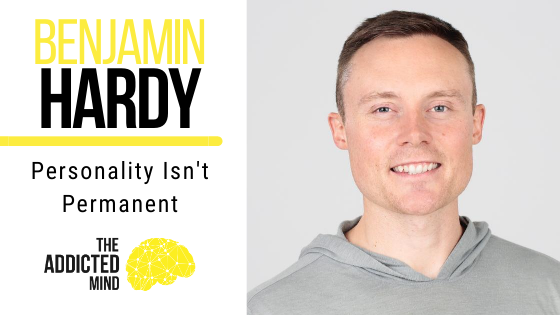On today’s episode of The Addicted Mind Podcast, Duane talks with author Benjamin Hardy about his personal experience with addiction and the chaos that comes along with it. Benjamin describes the process of overcoming his own addictions involved going through a “redemptive process,” which involved forgiving his father and rebuilding the relationship there. With trauma, you’re always looking in the rear-view mirror, but you need to make meaning going forward. Meaning is not going to strike you—you have to make it yourself. The beauty of this is that you can change the meaning of your past, Benjamin says. It’s key to have empathy for your old self.
Benjamin also talks about how writing about your trauma can really help. Turning away from the past, you can have hope for the future. Without a hope for the future, Benjamin says, the present becomes meaningless. You can also choose to ascribe a meaning to your past. We call it “meaning-making,” Benjamin says. Part of becoming emotionally-developed includes this idea of choosing the meaning of your past.
He shares a story about how you can actively work to a solution for something that didn’t go exactly how you planned instead of snapping to a quick decision. You can choose to frame it in a new way instead of being defined by a failure. Choosing the meaning going forward can change how you store that forever. In his story, Benjamin points to the fact that he was vulnerable enough to share his feelings with the people in question as part of the process.
Moving onto his book, Benjamin unpacks the idea that your personality is going to change, and that you have the power to choose who you want to be in the future. Your personality is just how you consistently show up. It’s crucial to have your identity based on who you actually want to be in the future. The same courage that moves you to say “I need help” is the courage it takes to tell people who you want to be in the future. It takes courage, as Benjamin says, because it’s uncertain. You’ll realize you might be rejected, but that you also need to do some “rejecting” to get you where you ultimately want to be. When you are open and honest, nothing is hiding anymore.
Key quotes:
05:05 — “There’s capital ‘T’ trauma and lowercase ‘t’ trauma.”
07:55 — “While I was running, I think I was subconsciously building confidence and thinking about my future.”
09:25 — “Memory is not objective; it’s more of a set of meanings we’ve given.”
12:40 — ”You’re a normal person even though you’ve made mistakes—and by the way, we’ve
all made mistakes.”
16:45 — “We get stuck remembering the past rather than imagining the future.”
29:45 — “You shorten the refractory period by taking action.”
33:30 — “Identity and personality are two different things.”
36:50 — “Who you want to be is part of your true self.”
38:30 — “We’re more likely to believe the stories we tell people about who we are.”
41:15 — “There is potential for you to look back at this thing you’re going through and be
grateful.”
Subscribe and Review
Have you subscribed to our podcast? We’d love for you to subscribe if you haven’t yet.
We’d love it even more if you could drop a review or 5-star rating over on Apple Podcasts. Simply select “Ratings and Reviews” and “Write a Review” then a quick line with your favorite part of the episode. It only takes a second and it helps spread the word about the podcast.
If you really enjoyed this episode, we’ve created a PDF that has all of the key information for you from the episode. Just go to the episode page at www.theaddictedmind.com to download it.
Supporting Resources:
Check out Benjamin’s website at https://benjaminhardy.com

